formerly eScholarship Editions


|
|
|
|
Your request for similar items found 20 book(s). | Modify Search | Displaying 1 - 20 of 20 book(s) | |
| 1. | 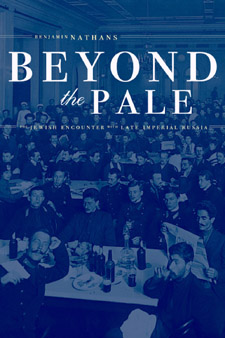 | Title: Beyond the pale: the Jewish encounter with late imperial Russia Author: Nathans, Benjamin Published: University of California Press, 2002 Subjects: History | Jewish Studies | Russian and Eastern European Studies Publisher's Description: A surprising number of Jews lived, literally and figuratively, "beyond the Pale" of Jewish Settlement in tsarist Russia during the half-century before the Revolution of 1917. Thanks to the availability of long-closed Russian archives, along with a wide range of other sources, Benjamin Nathans reinterprets the history of the Russian-Jewish encounter. In the wake of Russia's "Great Reforms," Nathans writes, a policy of selective integration stimulated social and geographic mobility among the empire's Jews. The reaction that culminated, toward the turn of the century, in ethnic restrictions on admission to universities, the professions, and other institutions of civil society reflected broad anxieties that Russians were being placed at a disadvantage in their own empire. Nathans's conclusions about the effects of selective integration and the Russian-Jewish encounter during this formative period will be of great interest to all students of modern Jewish and modern Russian history. [brief] Similar Items |
| 2. | 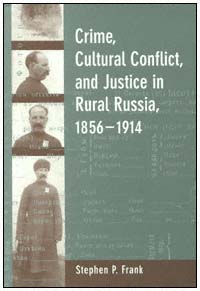 | Title: Crime, cultural conflict, and justice in rural Russia, 1856-1914 Author: Frank, Stephen 1955- Published: University of California Press, 1999 Subjects: History | Russian and Eastern European Studies | Cultural Anthropology | Social Problems | European History | Law | Criminology Publisher's Description: This book is the first to explore the largely unknown world of rural crime and justice in post-emancipation Imperial Russia. Drawing upon previously untapped provincial archives and a wealth of other neglected primary material, Stephen P. Frank offers a major reassessment of the interactions between peasantry and the state in the decades leading up to World War I. Viewing crime and punishment as contested metaphors about social order, his revisionist study documents the varied understandings of criminality and justice that underlay deep conflicts in Russian society, and it contrasts official and elite representations of rural criminality - and of peasants - with the realities of everyday crime at the village level. [brief] Similar Items |
| 3. | 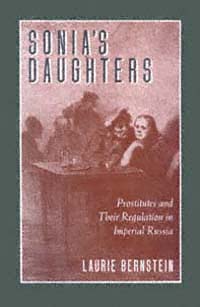 | Title: Sonia's daughters: prostitutes and their regulation in imperial Russia Author: Bernstein, Laurie Published: University of California Press, 1995 Subjects: History | European History | European Studies | Women's Studies | Russian and Eastern European Studies Publisher's Description: Prostitution in Imperial Russia was so tenacious that it survived not only the tsarist regime's most tumultuous years but the Bolshevik revolution itself. Laurie Bernstein's comprehensive study is the first to look at how the state and society responded to the issue of prostitution - the attitudes of prostitutes themselves, state regulation, societal reactions, and attempts at reform. She finds that prostitution and its regulation were integral to Russia's structures of gender, class, and politics.The first historian from outside the former Soviet Union to be granted access to these archival materials on prostitution, Bernstein takes the reader to the streets of Russia's cities, to the state-licensed brothels, medical clinics, hospital wards, halfway houses for "fallen women," and to the highest circles of the tsarist administration. [brief] Similar Items |
| 4. | 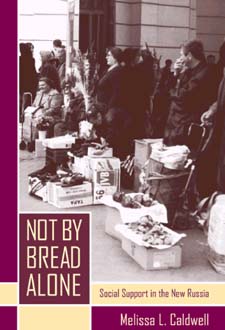 | Title: Not by bread alone: social support in the new Russia Author: Caldwell, Melissa L 1969- Published: University of California Press, 2004 Subjects: Anthropology | Russian and Eastern European Studies | European Studies Publisher's Description: What Muscovites get in a soup kitchen run by the Christian Church of Moscow is something far more subtle and complex - if no less necessary and nourishing - than the food that feeds their hunger. In Not by Bread Alone, the first full-length ethnographic study of poverty and social welfare in the postsocialist world, Melissa L. Caldwell focuses on the everyday operations and civil transactions at CCM soup kitchens to reveal the new realities, the enduring features, and the intriguing subtext of social support in Russia today. In an international food aid community, Caldwell explores how Muscovites employ a number of improvisational tactics to satisfy their material needs. She shows how the relationships that develop among members of this community - elderly Muscovite recipients, Russian aid workers, African student volunteers, and North American and European donors and volunteers - provide forms of social support that are highly valued and ultimately far more important than material resources. In Not by Bread Alone we see how the soup kitchens become sites of social stability and refuge for all who interact there - not just those with limited financial means - and how Muscovites articulate definitions of hunger and poverty that depend far more on the extent of one's social contacts than on material factors. By rethinking the ways in which relationships between social and economic practices are theorized - by identifying social relations and social status as Russia's true economic currency - this book challenges prevailing ideas about the role of the state, the nature of poverty and welfare, the feasibility of Western-style reforms, and the primacy of social connections in the daily lives of ordinary people in post-Soviet Russia. [brief] Similar Items |
| 5. | 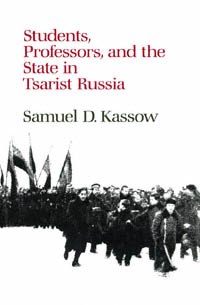 | Title: Students, professors, and the state in tsarist Russia Author: Kassow, Samuel D Published: University of California Press, 1989 Subjects: History | European History Publisher's Description: Between 1899 and 1911, student strikes and demonstrations disrupted Russia's higher educational institutions. The universities marched to their own peculiar tempo, however, and it was not until the strike of 1905 that student unrest coincided with mass movements outside the academic world. Students, Professors, and the State in Tsarist Russia , the first comprehensive study of the student movement during the waning decades of tsarist rule, centers on the interplay among student protest, faculty politics, and government policy toward the universities. The author examines the changing responses of students, faculty, and government officials to the crisis of the university and the old regime, throwing new light on the chronic political and social instability of the tsarist system. Kassow's familiarity with source material and his use of narratives from participants and observers alike provide both a trenchant analysis and a lively portrait of the times. Original and incisive, this book will be welcomed not only by specialists in the Russian field, but also by anyone interested in the dynamics of student protest and the role of the intellectual in popular movements. [brief] Similar Items |
| 6. | 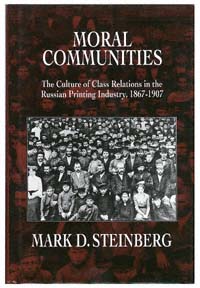 | Title: Moral communities: the culture of class relations in the Russian printing industry, 1867-1907 Author: Steinberg, Mark Published: University of California Press, 1992 Subjects: History | European History | Russian and Eastern European Studies Publisher's Description: This valuable study offers a rare perspective on the social and political crisis in late Imperial Russia. Mark D. Steinberg focuses on employers, supervisors, and workers in the printing industry as it evolved from a state-dependent handicraft to a capitalist industry. He explores class relations and the values, norms, and perceptions with which they were made meaningful. Using archival and printed sources, Steinberg examines economic changes, workplace relations, professional organizations, unions, strikes, and political activism, as well as shop customs, trade festivals, and everyday life. In rich detail he describes efforts to build a community of masters and men united by shared interests and moral norms. The collapse of this ideal in the face of growing class conflict is also explored, giving a full view of an important moment in Russian history. [brief] Similar Items |
| 7. | 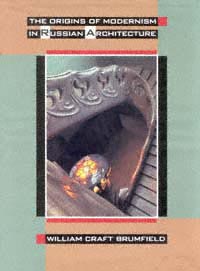 | Title: The origins of modernism in Russian architecture Author: Brumfield, William Craft 1944- Published: University of California Press, 1991 Subjects: Architecture | Architectural History | Russian and Eastern European Studies Publisher's Description: The dramatic transformation of Russian architecture from the 1880s to the 1917 revolution reflected the profound changes in Russian society as it entered the modern industrial age. William Craft Brumfield examines the extraordinary diversity of architectural styles in this period and traces the search by architects and critics for a "unifying idea" that would define a new architecture. Generously illustrated with archival materials and with the author's own superb photographs, this is the first comprehensive study by a Western scholar of a neglected period in European architectural and cultural history.Brumfield explores the diverse styles of Russian modernism in part by analyzing the contemporary theoretical debate about them: the relation between technology and style, the obligation of architecture to society, and the role of architecture as an expression of national identity. Steeped in controversy, Russian modernism at the beginning of the century foreshadowed the radical restructuring of architectural form in the Soviet Union during the two decades after the revolution. This authoritative work provides a new understanding of Russian architecture's last brief entrepreneurial episode and offers insight on our own era, when individual freedom and initiative may once again find expression in Russian architecture. [brief] Similar Items |
| 8. | 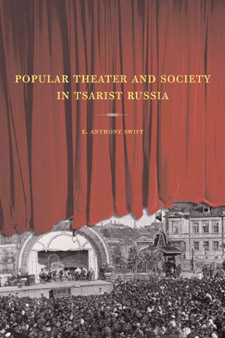 | Title: Popular theater and society in Tsarist Russia Author: Swift, Eugene Anthony Published: University of California Press, 2002 Subjects: History | European History | Russian and Eastern European Studies | Popular Culture | European Literature | European Studies Publisher's Description: This is the most comprehensive study available of the popular theater that developed during the last decades of tsarist Russia. Swift examines the origins and significance of the new "people's theaters" that were created for the lower classes in St. Petersburg and Moscow between 1861 and 1917. His extensively researched study, full of anecdotes from the theater world of the day, shows how these people's theaters became a major arena in which the cultural contests of late imperial Russia were played out and how they contributed to the emergence of an urban consumer culture during this period of rapid social and political change. Swift illuminates many aspects of the story of these popular theaters - the cultural politics and aesthetic ambitions of theater directors and actors, state censorship politics and their role in shaping the theatrical repertoire, and the theater as a vehicle for social and political reform. He looks at roots of the theaters, discusses specific theaters and performances, and explores in particular how popular audiences responded to the plays. [brief] Similar Items |
| 9. | 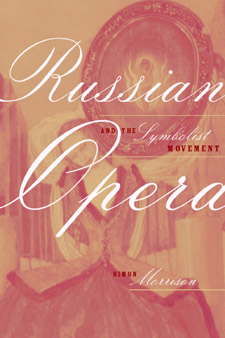 | Title: Russian opera and the symbolist movement Author: Morrison, Simon Alexander 1964- Published: University of California Press, 2002 Subjects: Music | Opera | Musicology | Composers | Russian and Eastern European Studies | Literature Publisher's Description: An aesthetic, historical, and theoretical study of four scores, Russian Opera and the Symbolist Movement is a groundbreaking and imaginative treatment of the important yet neglected topic of Russian opera in the Silver Age. Spanning the gap between the supernatural Russian music of the nineteenth century and the compositions of Prokofiev and Stravinsky, this exceptionally insightful and well-researched book explores how Russian symbolist poets interpreted opera and prompted operatic innovation. Simon Morrison shows how these works, though stylistically and technically different, reveal the extent to which the operatic representation of the miraculous can be translated into its enactment. Morrison treats these largely unstudied pieces by canonical composers: Tchaikovsky's Queen of Spades, Rimsky-Korsakov's Legend of the Invisible City of Kitezh and the Maiden Fevroniya, Scriabin's unfinished Mysterium, and Prokofiev's Fiery Angel. The chapters, revisionist studies of these composers and scores, address separate aspects of Symbolist poetics, discussing such topics as literary and musical decadence, pagan-Christian syncretism, theurgy, and life creation, or the portrayal of art in life. The appendix offers the first complete English-language translation of Scriabin's libretto for the Preparatory Act. Providing valuable insight into both the Symbolist enterprise and Russian musicology, this book casts new light on opera's evolving, ambiguous place in fin de siècle culture. [brief] Similar Items |
| 10. | 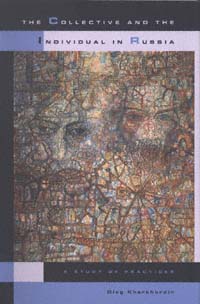 | Title: The collective and the individual in Russia: a study of practices Author: Kharkhordin, Oleg 1964- Published: University of California Press, 1999 Subjects: History | Social Theory | European History | Russian and Eastern European Studies | Intellectual History Publisher's Description: Oleg Kharkhordin has constructed a compelling, subtle, and complex genealogy of the Soviet individual that is as much about Michel Foucault as it is about Russia. Examining the period from the Russian Revolution to the fall of Gorbachev, Kharkhordin demonstrates that Party rituals - which forced each Communist to reflect intensely and repeatedly on his or her "self," an entirely novel experience for many of them - had their antecedents in the Orthodox Christian practices of doing penance in the public gaze. Individualization in Soviet Russia occurred through the intensification of these public penitential practices rather than the private confessional practices that are characteristic of Western Christianity. He also finds that objectification of the individual in Russia relied on practices of mutual surveillance among peers, rather than on the hierarchical surveillance of subordinates by superiors that characterized the West. The implications of this book expand well beyond its brilliant analysis of the connection between Bolshevism and Eastern Orthodoxy to shed light on many questions about the nature of Russian society and culture. [brief] Similar Items |
| 11. | 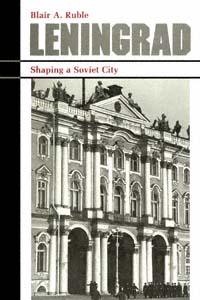 | Title: Leningrad: shaping a Soviet city Author: Ruble, Blair A 1949- Published: University of California Press, 1990 Subjects: Russian and Eastern European Studies | European History Publisher's Description: Throughout much of this century, cities around the world have sought to gain control over their urban destinies through concerted government action. Nowhere has this process of state intervention gone further than in the Soviet Union. This volume explores the ways in which local and regional political, economic, and cultural leaders in Leningrad determine the physical and socioeconomic contours of their city and region within such a centralized economic and political environment.The author examines four major policy initiatives that have emerged in Leningrad since the 1950s - physical planning innovations, integrated scientific-production associations, vocational education reform, and socioeconomic planning - and that have been anchored in attempts to plan and manage metropolitan Leningrad. Each initiative illuminates the bureaucratic and political strategies employed to obtain economic objectives, as well as the bureaucratic patterns which distinguish market and non-market experiences. The boundaries for autonomous action by local Soviet politicians, planners, and managers emerge through this inquiry. [brief] Similar Items |
| 12. | 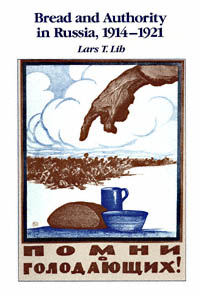 | Title: Bread and authority in Russia, 1914-1921 Author: Lih, Lars T Published: University of California Press, 1990 Subjects: History | European History | Politics | Russian and Eastern European Studies Publisher's Description: Between 1914 and 1921, Russia experienced a national crisis that destroyed the tsarist state and led to the establishment of the new Bolshevik order. During this period of war, revolution, and civil war, there was a food-supply crisis. Although Russia was one of the world's major grain exporters, the country was no longer capable of feeding its own people. The hunger of the urban workers increased the pace of revolutionary events in 1917 and 1918, and the food-supply policy during the civil war became the most detested symbol of the hardships imposed by the Bolsheviks.Focusing on this crisis, Lars Lih examines the fundamental process of political and social breakdown and reconstitution. He argues that this seven-year period is the key to understanding the Russian revolution and its aftermath. In 1921 the Bolsheviks rejected the food-supply policy established during the civil war; sixty-five years later, Mikhail Gorbachev made this change of policy a symbol of perestroika. Since then, more attention has been given both in the West and in the Soviet Union to the early years of the revolution as one source of the tragedies of Stalinist oppression.Lih's argument is based on a great variety of source material - archives, memoirs, novels, political rhetoric, pamphlets, and propoganda posters. His new study will be read with profit by all who are interested in the drama of the Russian revolution, the roots of both Stalinism and anti-Stalin reform, and more generally in a new way of understanding the effects of social and political breakdown. [brief] Similar Items |
| 13. | 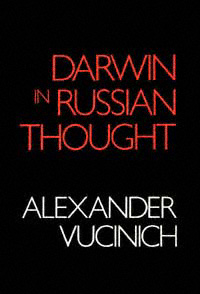 | Title: Darwin in Russian thought Author: Vucinich, Alexander 1914- Published: University of California Press, 1989 Subjects: Science | History and Philosophy of Science Publisher's Description: Darwin in Russian Thought represents the first comprehensive and systematic study of Charles Darwin's influence on Russian thought from the early 1860s to the October Revolution. While concentrating on the role of Darwin's theory in the development of Russian science and philosophy, Vucinich also explores the dominant ideological and sociological interpretations of evolutionary thought, providing a deft analysis of the views held by the leaders of Russian nihilism, populism, anarchism, and marxism.Darwin's thinking profoundly influenced intellectual discourse in Russia: it effected the emergence of "theoretical theology," a modern effort to provide theological responses to the revolutionary changes in the natural sciences, contributed to the evolution of a modern scientific community, and spurred the rapidly growing concern with the epistemological and ethical foundations of science in general. Scholarly battles were waged among the critics of Darwin - Karl von Baer, Nikolai Iakovlevich Danilevskii and Sergei Ivanovich Korzhinskii, and others - and the defenders of the faith.Vucinich is able to delineate the distinctive national characteristics of Russian Darwinism: the strong influence of Lamarckian thought, the delayed recognition of the contributions of genetics, the near-universal rejection of Social Darwinism, the early anticipation of the triumph of "evolutionary synthesis," and the heavy concentration on the social and moral aspects of evolutionary thought. Vividly argued and rich in detail, Darwin in Russian Thought provides a unique glimpse into the Russian psyche. [brief] Similar Items |
| 14. | 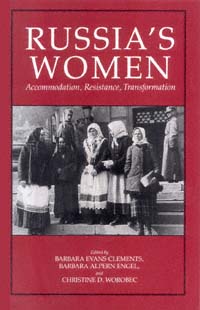 | Title: Russia's women: accommodation, resistance, transformation Author: Clements, Barbara Evans 1945- Published: University of California Press, 1991 Subjects: History | European History | Women's Studies | Russian and Eastern European Studies Publisher's Description: By ignoring gender issues, historians have failed to understand how efforts to control women - and women's reactions to these efforts - have shaped political and social institutions and thus influenced the course of Russian and Soviet history. These original essays challenge a host of traditional assumptions by integrating women into the Russian past. Using recent advances in the study of gender, the family, class, and the status of women, the authors examine various roles of Russian women and offer a broad overview of a vibrant and growing field. [brief] Similar Items |
| 15. | 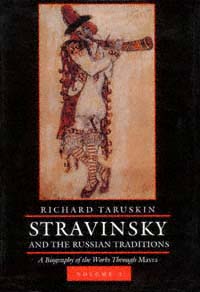 | Title: Stravinsky and the Russian traditions: a biography of the works through Mavra Author: Taruskin, Richard Published: University of California Press, 1996 Subjects: Music | Musicology | Russian and Eastern European Studies Publisher's Description: This book undoes 50 years of mythmaking about Stravinsky's life in music.During his spectacular career, Igor Stravinsky underplayed his Russian past in favor of a European cosmopolitanism. Richard Taruskin has refused to take the composer at his word. In this long-awaited study, he defines Stravinsky's relationship to the musical and artistic traditions of his native land and gives us a dramatically new picture of one of the major figures in the history of music.Taruskin draws directly on newly accessible archives and on a wealth of Russian documents. In Volume One, he sets the historical scene: the St. Petersburg musical press, the arts journals, and the writings of anthropologists, folklorists, philosophers, and poets. Volume Two addresses the masterpieces of Stravinsky's early maturity - Petrushka, The Rite of Spring, and Les Noces . Taruskin investigates the composer's collaborations with Diaghilev to illuminate the relationship between folklore and modernity. He elucidates the Silver Age ideal of "neonationalism" - the professional appropriation of motifs and style characteristics from folk art - and how Stravinsky realized this ideal in his music.Taruskin demonstrates how Stravinsky achieved his modernist technique by combining what was most characteristically Russian in his musical training with stylistic elements abstracted from Russian folklore. The stylistic synthesis thus achieved formed Stravinsky as a composer for life, whatever the aesthetic allegiances he later professed.Written with Taruskin's characteristic mixture of in-depth research and stylistic verve, this book will be mandatory reading for all those seriously interested in the life and work of Stravinsky. [brief] Similar Items |
| 16. | 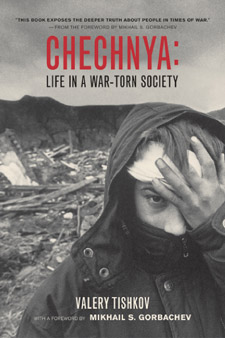 | Title: Chechnya: life in a war-torn society Author: Tishkov, Valeriĭ Aleksandrovich Published: University of California Press, 2004 Subjects: Anthropology | Ethnic Studies | European History | Sociology | Russian and Eastern European Studies Publisher's Description: This book illuminates one of the world's most troubled regions from a unique perspective - that of a prominent Russian intellectual. Valery Tishkov, a leading ethnographer who has also served in several important political posts, examines the evolution of the war in Chechnya that erupted in 1994, untangling the myths, the long-held resentments, and the ideological manipulations that have fueled the crisis. In particular, he explores the key themes of nationalism and violence that feed the turmoil there. Forceful, original, and timely, his study combines extensive interview material, historical perspectives, and deep local knowledge. Tishkov sheds light on Chechnya in particular and on how secessionist conflicts can escalate into violent conflagrations in general. With its balanced assessments of both Russian and Chechen perspectives, this book will be essential reading for people seeking to understand the role of Islamic fundamentalist nationalism in the contemporary world. [brief] Similar Items |
| 17. | 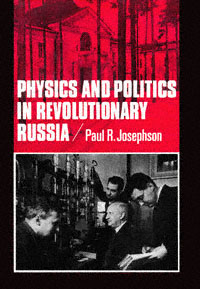 | Title: Physics and politics in revolutionary Russia Author: Josephson, Paul R Published: University of California Press, 1991 Subjects: History | History and Philosophy of Science | Russian and Eastern European Studies | Politics Publisher's Description: Aided by personal documents and institutional archives that were closed for decades, this book recounts the development of physics - or, more aptly, science under stress - in Soviet Russia up to World War II. Focusing on Leningrad, center of Soviet physics until the late 1930s, Josephson discusses the impact of scientific, cultural, and political revolution on physicists' research and professional aspirations.Political and social revolution in Russia threatened to confound the scientific revolution. Physicists eager to investigate new concepts of space, energy, light, and motion were forced to accommodate dialectical materialism and subordinate their interests to those of the state. They ultimately faced Stalinist purges and the shift of physics leadership to Moscow. This account of scientists cut off from their Western colleagues reveals a little-known part of the history of modern physics. [brief] Similar Items |
| 18. | 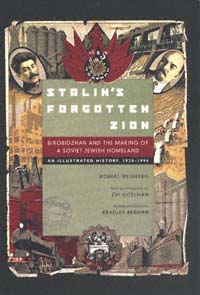 | Title: Stalin's forgotten Zion: Birobidzhan and the making of a Soviet Jewish homeland: an illustrated history, 1928-1996 Author: Weinberg, Robert E Published: University of California Press, 1998 Subjects: Jewish Studies | Russian and Eastern European Studies | History | Politics | Judaism Publisher's Description: Robert Weinberg and Bradley Berman's carefully documented and extensively illustrated book explores the Soviet government's failed experiment to create a socialist Jewish homeland. In 1934 an area popularly known as Birobidzhan, a sparsely populated region along the Sino-Soviet border some five thousand miles east of Moscow, was designated the national homeland of Soviet Jewry. Establishing the Jewish Autonomous Region was part of the Kremlin's plan to create an enclave where secular Jewish culture rooted in Yiddish and socialism could serve as an alternative to Palestine. The Kremlin also considered the region a solution to various perceived problems besetting Soviet Jews. Birobidzhan still exists today, but despite its continued official status Jews are a small minority of the inhabitants of the region. Drawing upon documents from archives in Moscow and Birobidzhan, as well as photograph collections never seen outside Birobidzhan, Weinberg's story of the Soviet Zion sheds new light on a host of important historical and contemporary issues regarding Jewish identity, community, and culture. Given the persistence of the "Jewish question" in Russia, the history of Birobidzhan provides an unusual point of entry into examining the fate of Soviet Jewry under communist rule. [brief] Similar Items |
| 19. | 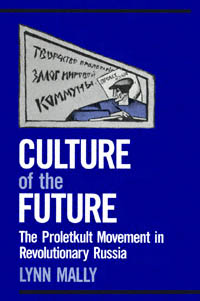 | Title: Culture of the future: the Proletkult movement in revolutionary Russia Author: Mally, Lynn Published: University of California Press, 1990 Subjects: Russian and Eastern European Studies | European History | Russian and Eastern European Studies Publisher's Description: Just days before the October 1917 Revolution, the Proletkult was formed in Petrograd to serve as an umbrella organization for numerous burgeoning working-class cultural groups. Advocates of the Proletkult hoped to devise new forms of art, education, and social relations that would express the spirit of the class that had come to power in the world's first successful proletarian revolution. Lynn Mally offers a detailed analysis of the Proletkult's cultural and political agenda. Drawing extensively on archival sources, she argues that the creation of a new culture proved as difficult and controversial as the creation of new notions of politics. From the outset, the Proletkult was divided by severe political and social tensions as members struggled to define the role of the organization and the cultural desires of the proletariat. What fused this divided movement was the shared belief that without radical cultural change the revolution would not succeed. The Proletkult's eventual decline graphically shows how political consolidation, institutional rivalries, and the devastating social consequences of the revolution and Civil War all worked together to limit the utopian potential of the October Revolution. [brief] Similar Items |
| 20. | 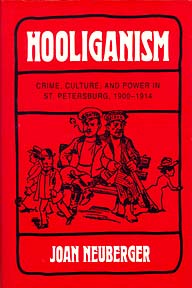 | Title: Hooliganism: crime, culture, and power in St. Petersburg, 1900-1914 Author: Neuberger, Joan Published: University of California Press, 1993 Subjects: History | Politics | Russian and Eastern European Studies | Criminology Publisher's Description: n this pioneering analysis of diffuse underclass anger that simmers in many societies, Joan Neuberger takes us to the streets of St. Petersburg in 1900-1914 to show us how the phenomenon labeled hooliganism came to symbolize all that was wrong with the modern city: increasing hostility between class . . . [more] Similar Items |